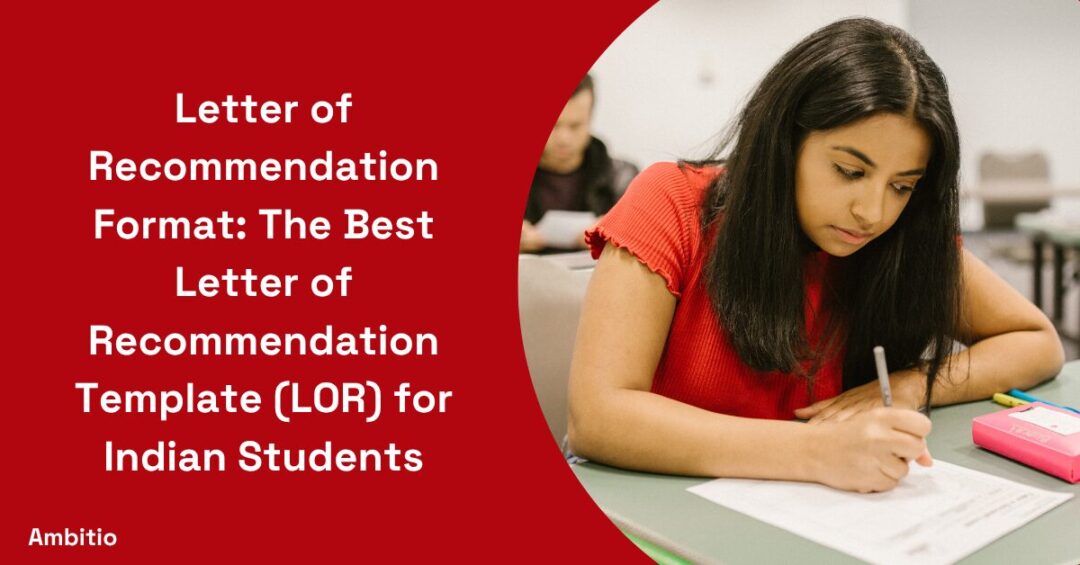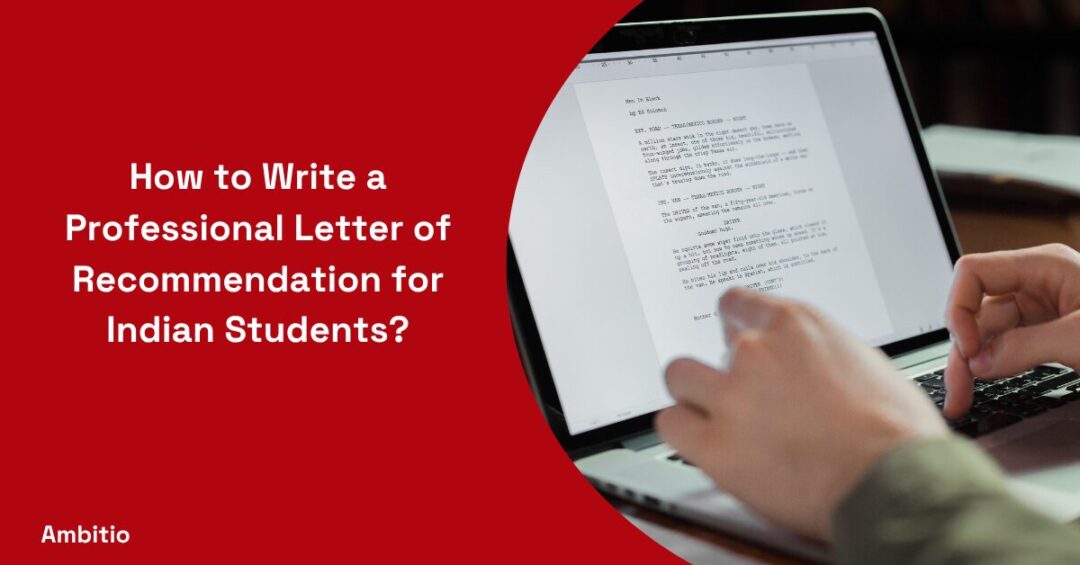22 July 2025
6 minutes read
How To Write A Letter Of Recommendation? An Ultimate Guide For Indian Students

Key Takeaways
- Know how to start a letter of recommendation with a clear intro, your relationship with the student, and a reason to recommend them.
- Use one strong anecdote that highlights the student’s unique strength or impact.
- Focus on the student’s goal—visa, college, or scholarship—and tailor the letter to support that path.
To Whom It May Concern — the four words that launch a thousand generic recommendation letters into the rejection pile. Whether you’re endorsing a brilliant applicant or just trying to survive a request from a student you barely know, writing a letter of recommendation is more than just filling space with praise. It’s about showing — not telling — why someone is a good fit, with specific examples, sharp anecdotes, and zero fluff.
But most letters either sound like a confused school essay or a lazy LinkedIn comment. And the worst? Those copy-pasted templates that never actually recommend anything. If you’re here to write a letter of recommendation for admission, scholarship, or anything in between, this guide will help you write your letter the right way: structured, concise, filled with qualifications that matter, and, most importantly, something that actually helps the applicant stand out — and not just survive.
How To Start A Letter Of Recommendation?
If you’re stuck on how to start a letter of recommendation for students, here’s the hard truth: most people write letters of recommendation like they’re filling out a bank form. No personality. No credibility. No clue how long they’ve known the student, or what to include in a letter that’ll actually make them a strong candidate.

Below are 4 sharp, surprising ways to write the recommendation the right way and help you focus your letter from the start.
1. Start With Your “Why” — Not Their “What”
Before listing the student’s strengths, introduce yourself with purpose. Mention how long you’ve known them, your relationship with the student, and why it’s a pleasure to recommend them — but make it personal, not robotic. This isn’t about name-dropping your job title. It’s about establishing credibility by showing you know the applicant and believe in their journey.
✅ Example: “As Priya’s literature professor for two years, I had the pleasure of teaching a quick learner whose public speaking skills and writing skills consistently left the class in awe.”
This immediately strengthens the connection and shows you’re not just writing to recommend someone — you’re vouching for them like a professional who genuinely knows the person.
2. Drop a One-Line Anecdote That Shows, Not Tells
Skip the generic adjectives. Instead, offer specific examples that highlight the student’s unique attributes that make them excel. Think of a moment — a classroom debate, a team project, a presentation — that demonstrates their leadership ability or exemplary professional performance.
✅ Example: “I still remember when Neeraj rewrote our department’s broken data tracking system — as a high school student — purely because he thought it was inefficient.”
That’s not just an endorsement. That’s proof. These kinds of examples make them stand out and showcase skills or qualifications that hiring managers and admissions officers actually care about.
3. Frame Your Endorsement Like a Business Letter (But With Heart)
Remember, you’re not writing a diary entry. Use professional language, formal tone, and correct spelling and grammar. A strong letter of recommendation looks polished — not like it was whipped up in Google Docs last night.
✅ Use clear formats like:
“Dear [Title/Name],”
“To Whom It May Concern,” (if you really don’t know)
And yes — your spelling and grammar mistakes will sabotage the letter. So proofread it like a resume. Because this letter isn’t just for the person you are recommending — it’s a reflection of you, too.
4. Don’t Just Recommend — Forecast Their Impact
Good writing a recommendation means you’re not just saying they’re great. You’re explaining why they’ll be an asset to the position or program they’re applying to. Think of it like this: What will they bring to the table that the admissions committee or hiring manager hasn’t seen before?
✅ Example: “Given her unmatched curiosity, resilience, and knack for solving real-world problems, I believe Mansi will excel in any research-heavy academic program — especially those demanding critical thinking and innovation.”
5 Tips To Write A Letter Of Recommendation
Most people either go full Shakespeare and turn it into a poetic eulogy, or they write a dry summary that sounds like a bureaucratic checklist. The admissions committee isn’t looking for recycled adjectives and polite praise. They want proof. They want perspective. And if you’re writing a letter of recommendation for student success — not just survival — then these tips will save you from sounding like ChatGPT on autopilot.

This section? It’s not just for the overachieving toppers. It’s also for those writing a letter of recommendation for student with low grades, or even a letter of recommendation for student visa that actually passes scrutiny. And yes — if you’re the Head of Department and someone just asked you to recommend a kid you vaguely remember from 2022, you’re in the right place.
1. Don’t Just Write — Strategize Based on the Student’s Goal
Before you even write the letter of recommendation for student visa, college, or scholarship, figure out: What’s the point of this letter? A glowing review won’t matter if it doesn’t match what the receiving institution values. A research lab wants analytical thinking. An art school wants creativity. A visa officer wants proof of intent and character. Tailor your tone, examples, and endorsements accordingly — it’s not a one-size-fits-all document.
2. Low Grades? Highlight Grit, Not Grades
If you’re writing a letter of recommendation for student with low grades, don’t pretend their transcript is perfect — that’ll only hurt your credibility. Instead, focus on their growth, work ethic, and how they overcame obstacles. Use real stories that paint them as resilient and committed. Show that they’re not just a grade — they’re a journey. And yes, that narrative can move admissions officers when done right.
✅ Example: “While Rohan’s academic performance was not always consistent, his relentless curiosity and refusal to give up on complex concepts made him one of the most dedicated learners I’ve mentored.”
3. If You’re a HoD, Flex That Authority — But With Precision
A letter of recommendation from Head of Department holds serious weight — but only if it sounds like you actually knew the student. Don’t just throw your title around. Mention your interactions with the student in a department setting, any direct evaluations, and your insights on their potential. Use your position to validate their academic capabilities, not just to endorse them vaguely.
✅ Pro tip: “As the Head of the Mechanical Engineering Department, I observed Karthik consistently take initiative during interdisciplinary research collaborations — a trait rare even among our top-tier postgraduates.”
4. The Best Letters Show, Not Tell — Through Moments
Every letter of recommendation for student should offer at least one specific scenario where the student displayed intelligence, creativity, responsibility, or maturity. Admissions teams and visa officers remember stories, not adjectives. If they built a prototype, won a debate, mentored juniors — say it. That’s how you go from cliché to compelling.
✅ “I still remember Ananya volunteering to lead the outreach program when the original lead dropped out two days before the event. She didn’t just manage — she delivered.”
5. For Visa Letters — Keep It Professional, Clear, and Credible
A letter of recommendation for student visa is less about poetic flair and more about credibility and character. Mention the student’s course of study, their academic interest, and why they’re a suitable candidate to study abroad. Stick to the facts — your relationship with the student, their attitude, and their intent to return if required. Sound like a professional. Be crisp. And never exaggerate — visa officers can smell a fake from across the border.
✅ “I fully support Harshit’s application for a student visa as he has shown outstanding commitment to his coursework and has a well-defined academic plan aligned with his goals in biotechnology.”
Conclusion
If you barely do, ask the right questions before you write. Avoid templates, drop the clichés, and think of the reader on the other end — someone trying to make a decision with limited information.
A good recommendation doesn’t oversell. It informs, supports, and adds weight to the student’s application. Whether it’s for a visa, admission, or scholarships, write like you want to help — not just tick a box. That’s what makes your letter matter.
But if you want an expert, who knows what universities like to see in you. Who has written 1000s of LORs for students placed in top universities and who writes personalized Letter of Recommendation then you should book a call with Ambitio. Firstly, it is completely free consultation and secondly – they give you the right roadmap.
FAQs
How should I address the recipient?
Whenever possible, address the recipient by name and title. If you’re unsure, use “Dear Hiring Manager,” “Dear Admissions Committee,” or “To Whom It May Concern”
What information should be included in the introduction?
The introduction should mention your purpose for writing, your relationship with the candidate, and how long you’ve known them
Is it important to declare your professional relationship with the applicant?
Yes, explaining your connection (e.g., direct supervisor, professor) adds credibility to your recommendation and clarifies your perspective
How formal should the opening paragraph be?
A recommendation letter should use a professional and formal tone from the start, matching the context (academic, employment, etc.)
Should I include the reason for the letter immediately?
Yes, stating the specific role or opportunity the candidate is being recommended for in the opening is best practice

You can study at top universities worldwide!
Get expert tips and tricks to get into top universities with a free expert session.
Book Your Free 30-Minute Session Now! Book a call now




























